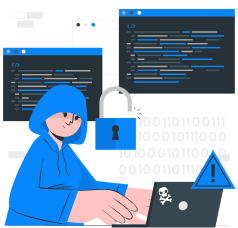Why choose cybersecurity?
Opting for a career in cybersecurity provides an exciting field with plenty of job prospects, diverse roles, and ongoing learning opportunities. The constantly changing landscape of cyber threats means you'll have stable employment, good pay, and the chance to protect digital information and privacy. In today's digital age, cybersecurity expertise is in high demand, opening up many paths for career growth and development.
-
What is
cybersecurity? Why is it important?
Cybersecurity is like a shield for your digital world. It's all about making sure that your computers, networks, and personal information stay safe from people who want to do harm or sneak in without permission. It's super important because it keeps your private stuff private, stops bad guys from stealing your money, and ensures that important things like power grids and communication systems keep running smoothly without any cyber trouble.
-
Define the terms
Virus, Malware, and Ransomware.
Virus: This is a type of program that duplicates itself and moves to other files or systems, often causing damage along the way.
Malware: This term refers to any harmful software that disrupts or gains unauthorized access to computer systems. It's like a collective term for all kinds of digital troublemakers.
Ransomware: Here we have a specific type of malware that locks up files or even entire computer systems and demands payment (a ransom) for unlocking them. It's like a digital hostage situation for your data. -
Explain the
difference between a Threat, Vulnerability, and Risk in cybersecurity.
Threat: This is any possible danger or harmful event that could cause trouble by taking advantage of weaknesses in security.
Vulnerability: Think of vulnerabilities as the weak spots or gaps in your security armour. These are the areas where threats can sneak in or cause damage. Risk: Risk is like the chance of a threat finding and exploiting one of those vulnerabilities. It's about how likely it is to happen and how bad the consequences might be.
-
What is
Phishing? Provide an example.
Phishing: Phishing is a type of cyberattack where scammers use fake emails or messages to trick people into giving away personal information.
Example: You might get an email that looks like it's from your bank, asking you to click a link and enter your login details. But if you do, you're actually giving your info to the scammer.
-
How do firewalls
protect network security?
Firewalls act as a barrier between your computer network and the outside world, like a gatekeeper. They monitor incoming and outgoing traffic based on a set of rules. If data trying to enter or leave your network doesn't meet those rules (like being from an unauthorized source or containing suspicious content), the firewall blocks it. This helps prevent unauthorized access, viruses, malware, and other threats from compromising your network's security.
-
What is a VPN,
and why is it used?
A VPN, or Virtual Private Network, is a tool that encrypts your internet connection, shielding your online activities from prying eyes. It is used to enhance privacy, security, and access to restricted content by creating a secure connection to the internet through servers located elsewhere. VPNs are commonly employed by individuals and organizations to safeguard sensitive data and bypass geographical restrictions.
-
Explain the
concept of a secure Password.
A secure password is a unique combination of characters, symbols, and numbers that's hard for others to guess or crack. It should be long enough to resist brute force attacks and avoid common phrases or easily guessable patterns. Regularly updating and not sharing passwords enhances security.
-
When is
resampling done?
Resampling is typically performed in data analysis when there's a need to adjust the frequency or duration of data points, often to match a desired timeframe or to reduce noise. It's a fundamental technique in statistics and signal processing, aiding in making data more manageable or representative without infringing on copyright concerns.
-
What are the
common techniques for securing a computer network?
Common techniques for securing a computer network include implementing strong passwords, using encryption for data transmission, and regularly updating software and security patches.
-
What is
two-factor authentication, and why is it important?
Two-factor authentication adds an extra layer of security to your online accounts, requiring a second form of verification, like a code sent to your phone. It's essential as it greatly reduces the risk of unauthorized access, safeguarding your personal information from potential hackers.
Interview questions
Ready to Take the Next Step? Enroll Now!
Seize the opportunity to transform your future with our
comprehensive courses at
Talent
Turbo. Whether you're aiming for career advancement, personal growth, or
simply
pursuing
a passion, our diverse range of programs awaits. Join our
community of learners and
embark on a journey of discovery, learning,
and achievement.

